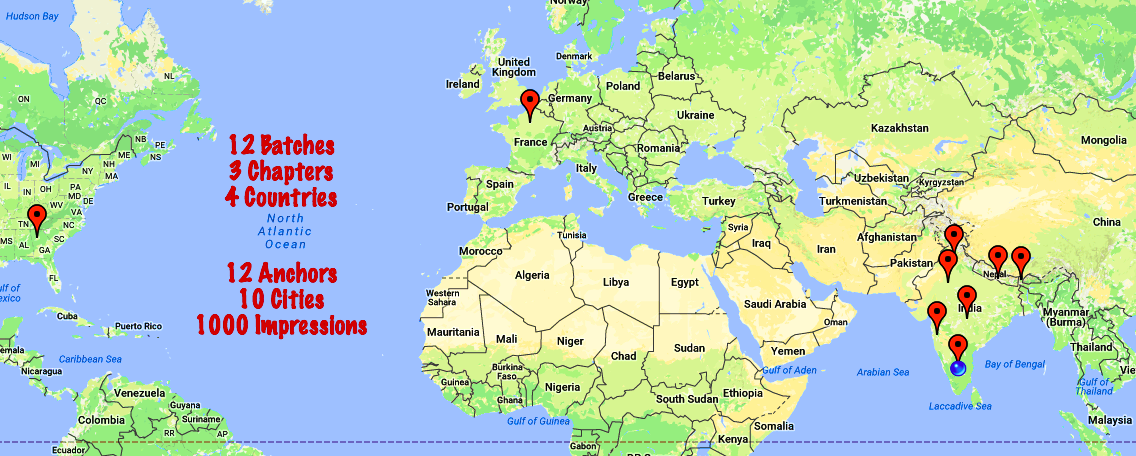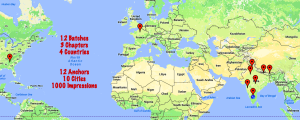When we launched iKen two years ago, (The Way of Successful Entrepreneurs and Launching Pre Entrepreneur Program) we weren’t sure if a “reality-focussed”, “deep-dive format”, “away from jingoism”, bootcamp would have many takers. More importantly we weren’t sure of the impact that we would have. This was after all a side project for everyone involved.
Two years hence, this is a post looking back at that journey. We have covered quite a distance and have some great wins and have undergone few reality checks as well.
Wins
First the good news.
We have three chapters (Bangalore, Pune Atlanta), have given talks on iKen in four countries (USA, France, Nepal, India) and ten cities(and counting). More than hundred participants (from 10 batches) and more than 6000 impressions (people who attended iKen talks). And most important metric of all, we have fifteen+ revenue making companies. Some have taken the investment route and have raised seed funds.
But the most important metric of all for me is many graduates have become dedicated anchors themselves, teaching, learning and owning the program. The online tools and the “train the anchor” manuals have made the program a smooth automated engine.
30% of the folks decided to temporarily park the idea and went back to jobs but continue to attend iKen sessions at regular intervals.
While we are immensely proud of what we have accomplished, however there are certain targets, which we did miss by a wide margin.
First lets look at the genesis. The model we had in mind was that of a toastmaster. Peer supported skill building bootcamp with a rigorous structure of tasks.
The idea is to provide the following :
- Learn entrepreneurial decision models (primarily effectuation but we also have lean components (business canvas) used in certain sections)
- A space for deep and contextual discussions on entrepreneurship for early enterpreneurs (people who want to startup) as early enterpreneurs are either ignored or misguided(sometimes even taken for a ride).
- Antidote for the sensational, shallow and sometimes wrong information spread by media.
- Enable co-creation and collaboration and build the space and environment for that to happen.
- A neutral space (as opposed to cheerleading skeptical or derisive) where people are comfortable in deciding even not to do a startup.
Lessons
Roadblocks with Peer-to-Peer Models
Trust or lack of it is the major factor for failure of peer to peer learning. Lack of trust is actually two fold, one is doubt in capability and other is of trust in intentions and focus on control. The prevalent thought process that someone more knowledgeable and powerful (read mentor) will show the right way also contributes to devaluing what one has around them.
We have created the some tasks and rituals for participants to get over that habit but it has been hard. The teacher student model becomes more prevalent as you navigate away from Bangalore. However as they graduate and continue to attend the chapter the peer to peer collaboration has been immense.
Unlearning the Predictive Behaviour
One of the common patterns across all the cohorts is this belief that there is a way to game this “Startup” journey. Its almost like the cracking the interview; originality doesn’t matter, there are some packaged right answers and one needs to learn them.
I remember this one time in Sikkim where I spent an hour and half explaining why “starting with investors” is not the right way to think about a startup in early stages. The first question I got asked after the talk was “What is the right way to write the business plan so that I get funded ?”
Effectuation and iKen is nothing but intellectual support for common sense, but sometimes the power of accumulated “knowledge” is hard to ignore or wipe away.
Chapter’s Growth and Format
We expected at least 50% people to continue to attend the sessions even after completion of mandatory the 6-8 weeks. But that is reduced to one or two per cohort i.e 10%. There are two-three reasons why this is happening :
- Folks do not see the value in continued attendance as the focus shifts to the new batch.
- People who have not started their ventures are shy of attending.
- People don’t understand the value of agenda less networking.
The last one is really important and most people undervalue it. The trust is built overtime and we have seen incredible examples of camaraderie and trust built amongst the folks (mostly anchors but few regular attendees too) who attend at least two session in a month.
We have also realised the chapter’s success is dependent largely on the geographic location and the first few champions that get involved in the Chapter. Inorganic growth doesn’t get the right people and often dies away. Self-selected stake holders are the way to go in growing chapters and that takes time.
What Next ?
We will continue to focus on quality and continue to grow effectually. We have incredible set of anchors and a nation aspiring to break all barriers. Join us at https://ikenstartup.com/. Follow us @ https://twitter.com/ikenstartup; Watch founder stories @ iKen YouTube



